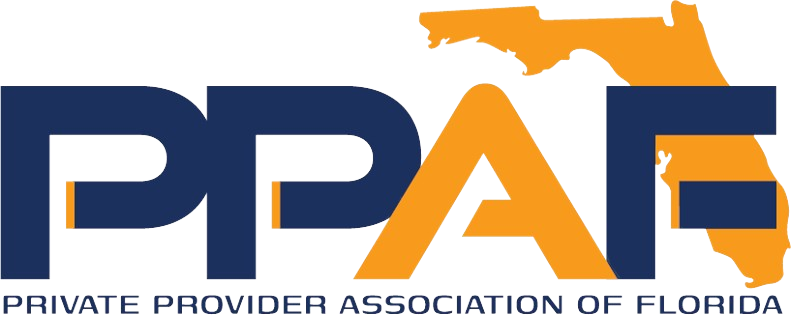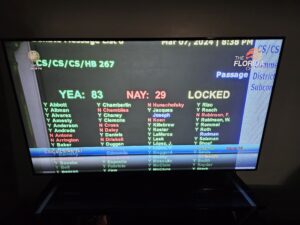HB 267 SB 684
CREATION OF THE BILL AND THE PROCESS
On March 6, 2024 the Florida Senate passed Senator DiCeglie‘s SB 684 with Amendment 505102 to the house bill. A second amendment relating to health care proposed by Senator Gruters, was also passed. However, Senator Gruters later withdrew his amendment, 804906.
March 7, 2024, Representative Esposito accepted Amendment 505102, and put House Bill 267 to the floor. Bill 267 passed with flying colors.
PPAF’s lobbyist and Executive Director, Lisa Miller, had researched all of the bills in the house and senate to find ones that contained changes to the 553.791 Florida Statutes, affectionately known as “The Private Provider Statute.” After working with both Senator (Nick) DiCeglie (R-Pinellas County) and Representative (Tiffany) Esposito (R-Fort Myers), Lisa connected Senator DiCeglie and Representative Esposito on the two bills to marry the bills together. Typically to get a bill through to Governor DeSantis for signature, a bill must have both a Senate and House component. Senate bills have even numbers, House bills have odd numbers.
For a section of law to be changed the Florida legislature requires that the proposed legislation include the particular section number in the bill. Congress on the other hand can amend/change any law by inserting changes into any bill regardless if the bill’s subject is the topic of the proposed law change or not.
The Florida Home Building Association (FHBA) and PPAF have similar interests. Both organizations want to improve public safety, streamline permitting and inspections for contractors, owners, developers, private providers and the general public, and want to trim down the red tape were possible. Board Members Dan Sinclair (Sinclair Construction), Tyson Scott (Coastal Code), and Al Wilson (FBCCA) reached out to the FHBA President, Garrett Anderson, who worked together with PPAF to get this bill through the Senate and House with the key amendments. His CEO, Rusty Payton, was critical to getting this bill through. Al and FBCCA also had other lobbyists and supporting developers working in the background.
Almost all PPAF member companies were built by retired Local Building Officials, Plan Reviewers and Inspectors for the counties and municipalities. A special thank you to Board Member Rune Lero for utilizing his experiences as the Pasco County Building Official to suggest the audit procedures that he and Dan Sinclair wrote together, and were tweaked by Lisa Miller, the Senator‘s staff members, and the members of the Florida Association of Counties.
BILL SUMMARY
PPAF Additions
- 2 pm notice dropped to notice with no timeline, with approximate date and time of inspection
- Audit procedures must be spelled out
- Building Departments must create audit procedures and make them public – online and in print
- Building Departments must audit their own staff for 6 months and make the results public prior to auditing private providers
- Audits are 4 times per year instead of 4 times per month
- Notice must be provided in writing prior to auditing private providers
- Definition of private provider changed from individual to a firm
- NTBO can be signed by the fee owner or their contractor
FHBA Addition
- Windows and doors in non-coastal areas no longer need to be impact resistant
- Window and door replacements do not require drawings. This was already in the code. However, since the building department at Bay County cannot seem to read code, the FHBA had it made more clear to them
Senator DiCeglie and Representative Esposito Core Bills
- Permit timelines are dramatically shortened, some as short as 5 business days
- 10 business days for permits when signed off by private provider, or permit is deemed issued. Sealed drawings. See below for details.
- 12 business days for master planned permits, see details below
- Requires building department to make themselves available for an in-person or virtual meeting at second kickback
- Details
- Requires a local government to approve, approve with conditions, or deny a complete and sufficient permit application within the following timeframes:
- 30 business days for applicants using local government review for certain structures less than 7,500 square feet, previously set at 120 days;
- 60 days for the following applicants using local government review, previously set at 120 days:
- Certain structures more than 7,500 square feet,
- Signs,
- Nonresidential buildings that are less than 25,000 square feet;
- Multifamily residential, not exceeding 50 units;
- Site-plan approvals and subdivision plats not requiring public hearing or notice; and
- Lot grading and site alteration.
- 12 business days for applicants for a permit under an already-approved master plan permit, currently dependent on the local program, or 30 days for single-family residential dwellings;
- 10 business days for applicants for a single-family residential dwelling for a property owner who participates in a Community Development Block Grant–Disaster Recovery program, previously set at 15 days; and
- 10 business days for applicants using an engineer or architect private provider who affixes his or her professional seal, previously set at 120 days;
- Requires a local government to determine if a building permit application is complete within 5 business days of receiving the application, previously set at 10 days.
- Provides an exception to the fee reduction provision when a delay is caused by the applicant, by a force majeure, or other extraordinary circumstance.
- Provides that completing an internship program for residential building inspectors is a pathway for licensure as a residential building inspector.
- Provides that the Commission must review certain standards for unvented attics before December 31, 2024, and that certain standards will be effective related to such attics on July 1, 2025.
- Requires a local government to approve, approve with conditions, or deny a complete and sufficient permit application within the following timeframes:
FINAL BILL AND ANALYSIS
The bill was ordered engrossed and enrolled. However, it does not appear that the final bill is available yet at flsenate.gov. You can find the bill here: HB267_Final_3_12_2024_Dan-Sinclair
An analysis of the bill can be found by clicking here.
To contribute to PPAF and our efforts, click here.
Dan Sinclair, Sinclair Construction
Florida Licensed Building Inspector, State Certified General Contractor in 8 states plus by jurisdiction in Colorado, Florida Certified Roofing Contractor, ICC Certified Commercial Building Inspector, and holds a number of independent and manufacturer certifications. Dan has been in the construction industry since the 1970’s.




